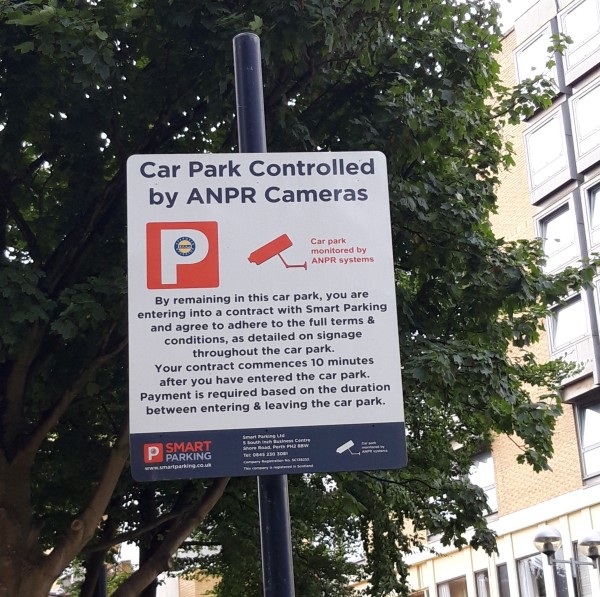Surveillance for corporate profit
Automatic Number Plate Recognition (ANPR) surveillance seems to be on the rise since your ‘umble scribe first reported on its use by B&NES for access control to the council’s rubbish tips recycling centres some years ago.
It’s now being used by parking management companies to catch drivers who overstay their welcome in private car parks, as shown by the example below spotted in central Bristol today outside the snappily named Double Tree by Hilton hotel on Redcliffe Way.

The adjective Orwellian is no exaggeration if one peruses the company’s marketing brochure to glean how ANPR is used. It states:
Smart Parking’s automatic number plate recognition (ANPR) / license plate recognition (LPR) parking system is a simple, efficient and cost-effective way of off-street car park management.
Cameras placed at entry and exit points take a timed photo of the number plate of each vehicle entering and exiting the premises. Customers then simply pay and walk, using their license place as identification. We can also configure sites to have validated parking which can include permit only, staff only, free limited time parking and definable grace periods, to name a few.
As with our other solutions, SmartANPR/LPR work with the SmartCloud platform to deliver occupancy, stay rates and enforcement efficiency reporting for car park management and future planning.
Note the American English usage of license.
Of course, for any users who outstay their welcome, the company wants to make a profit with its penalty charges (note to any passing journalists, despite your constantly referring to these charges in your copy as ‘fines‘, they are in fact invoices; only the judicial authorities can impose fines. 
The law allows the DVLA to disclose vehicle keeper information to those who can demonstrate a reasonable cause for requiring it. Reasonable cause is not defined in legislation but the Government’s policy is that it should relate to the vehicle or its use, following incidents where there may be liability on the part of the driver.
The DVLA also charges a fee for the disclosure of this information, as the response further clarifies:
The fees levied by the DVLA for Fee Paying Enquiries are set to recover the costs of processing requests and ensure that the cost is borne by the requester and not passed onto the taxpayer.
Even so, the agency has fallen foul of the Information Commissioner’s Office for “not using the correct lawful basis to disclose vehicle keeper information“, as The Guardian reported a few months ago.
Your correspondent feels an urge to submit another FoI request for the DVLA to enquire about the amount of money received by the agency for this service, but has more than a suspicion such a request would be refused on the grounds of commercial confidentiality.